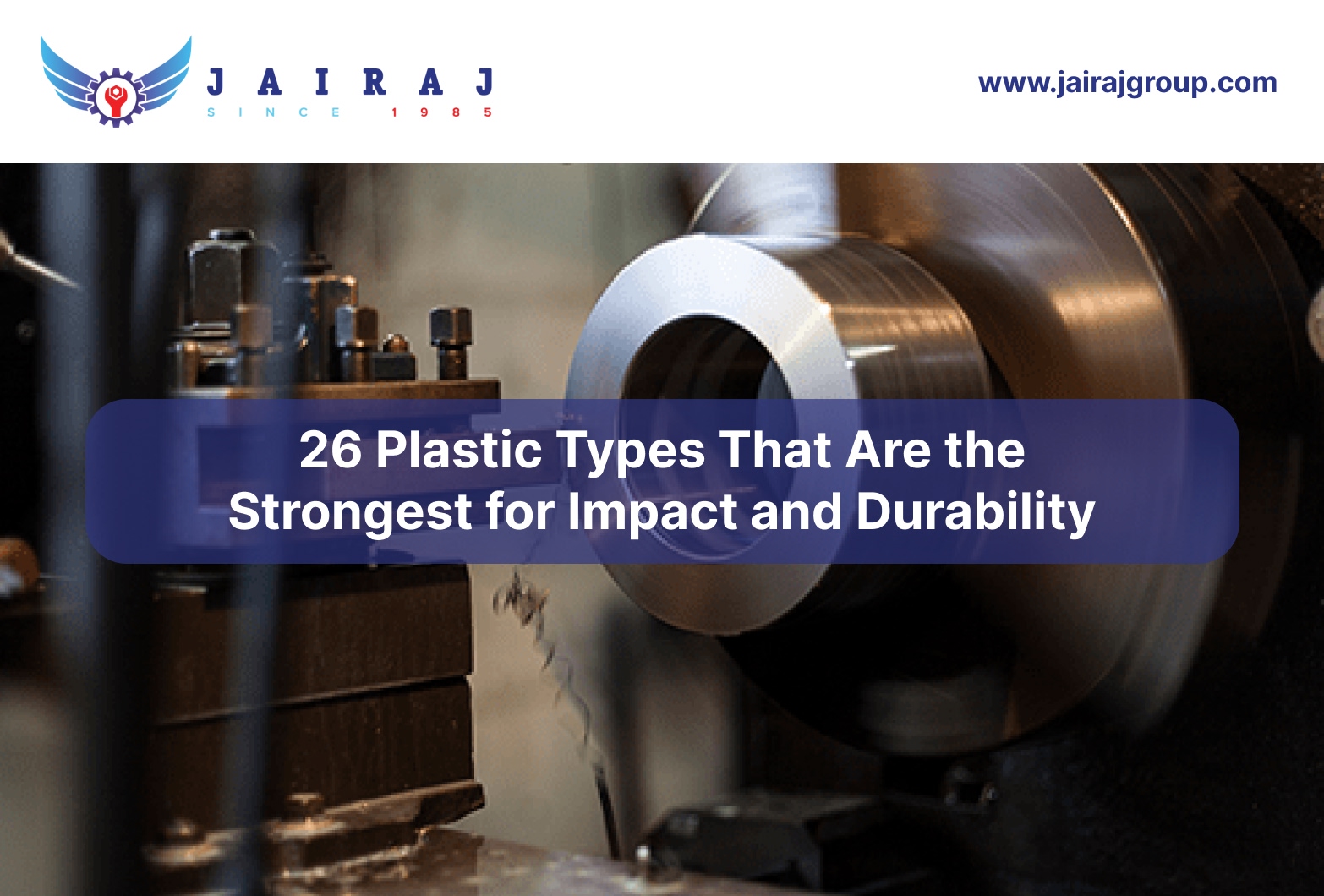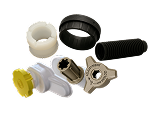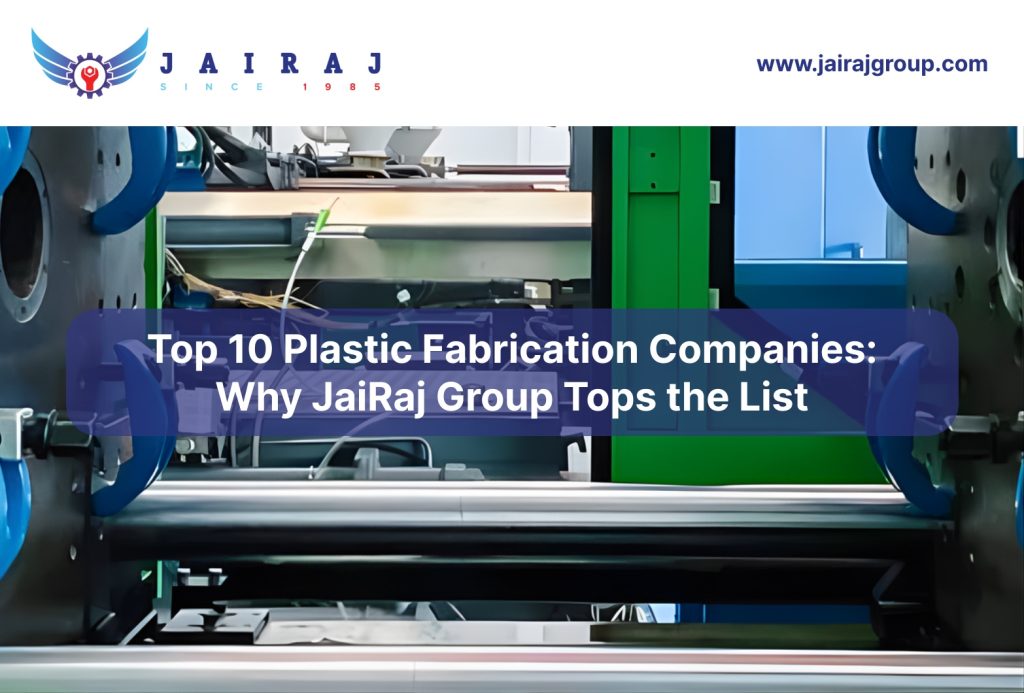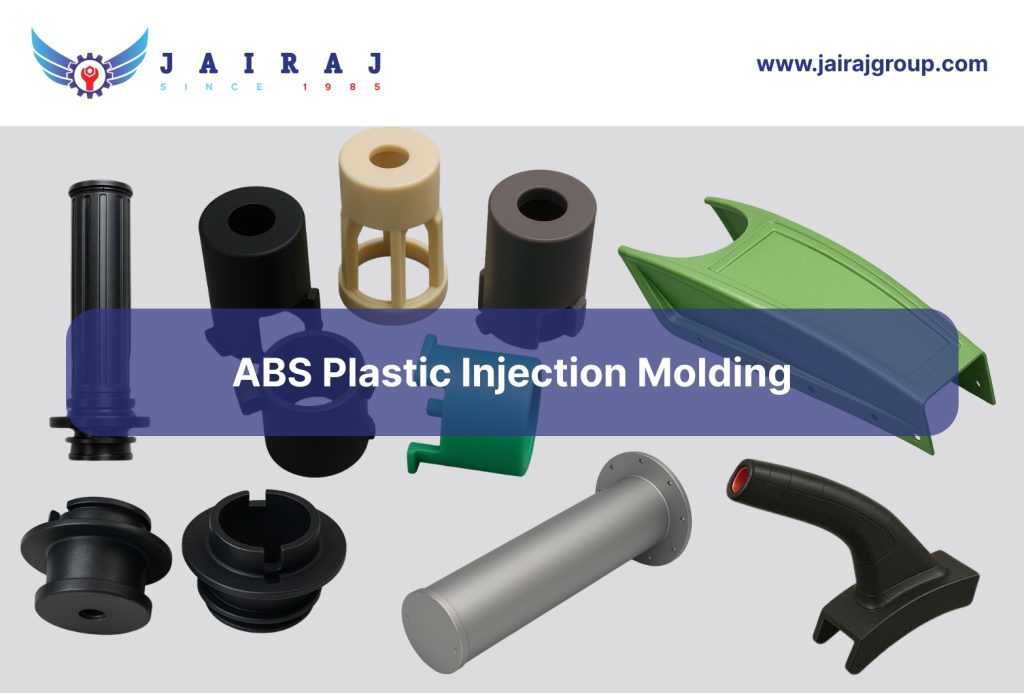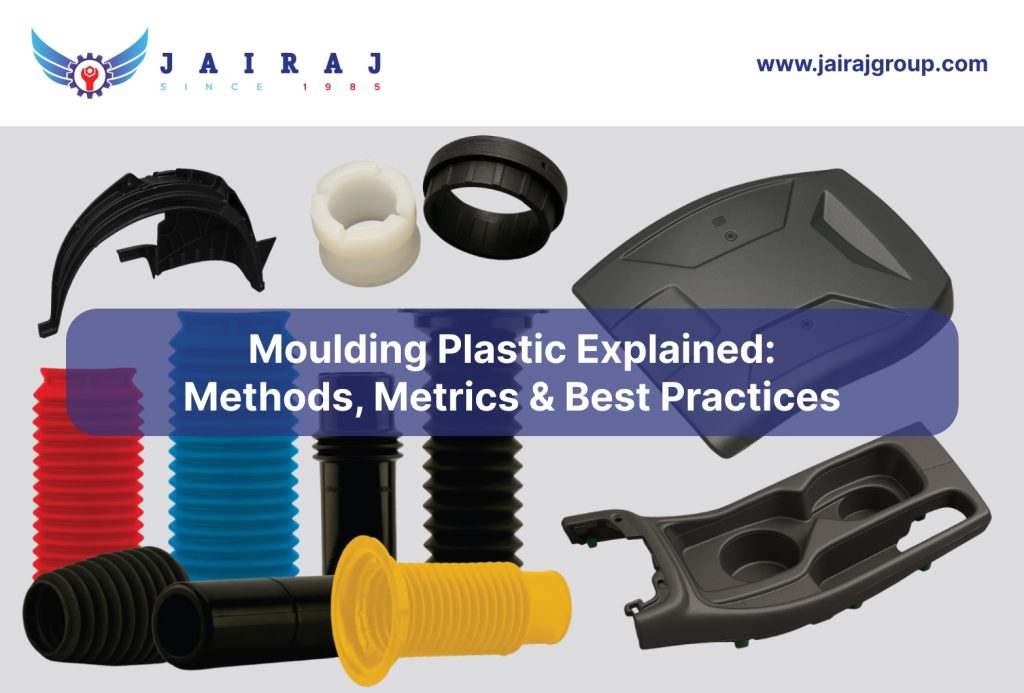When choosing the strongest plastic for industrial manufacturing, procurement managers, design engineers, and plant managers need to take into account aspects like long-term performance, mechanical strength, and resistance to harsh environments.
This is especially true in sectors like automotive, defense, aerospace, heavy equipment, and mobility. In 2022, Polypropylene (PP) had the largest share of demand at 32%, or 6.1 million tons, highlighting its critical role in durable plastic applications across industries.
This article explores the strongest types of plastic used across industries and their applications, helping manufacturers make informed decisions about materials that offer superior durability and impact resistance.
Key Takeaways
- PEEK and POM are top choices for durable, high-performance components in automotive and industrial applications.
- Polycarbonate and Acrylic offer excellent impact resistance and clarity for critical aerospace and automotive parts.
- Nylon and PP are versatile, providing excellent performance in automotive, heavy equipment, and industrial settings.
- Polyimide and PBT excel in extreme temperature and chemical conditions, making them suitable for aerospace and defense applications.
- High-performance plastics like ABS and POM are essential for precision parts in demanding environments.
Important Elements of Sturdy Plastics for High-Performance Industrial Uses
The strength of a plastic material is critical in industries such as automotive, aerospace, defense, and heavy-duty equipment, where components are subjected to extreme conditions. When selecting materials for these high-performance sectors, it’s important to consider factors such as:
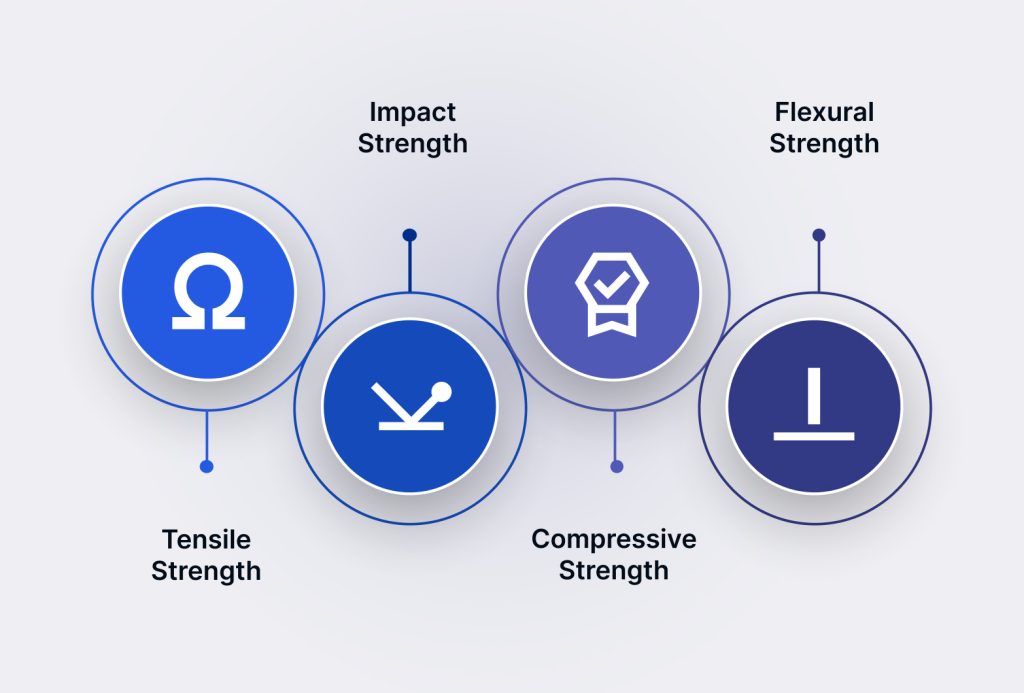
- Tensile Strength: The ability to resist breaking under tension, crucial for automotive parts and structural components in heavy equipment.
- Impact Strength: The ability to absorb energy without cracking or breaking, essential for defense and aerospace components.
- Compressive Strength: Resistance to being crushed or deformed under compressive force, particularly important in construction, mining, and agricultural equipment.
- Flexural Strength: The material’s resistance to bending, vital for components in mobility & EVs and industrial machinery.
When high-performance automotive components like brake pedals and shockers must endure extreme stress and repeated impact, Jairaj Group delivers precision solutions using injection molding and extrusion-molded Nylon 6/66. Our rotational molding for plastic bellows & struts ensures uniform wall thickness and structural integrity, while machining and turning provides exact tolerances, addressing durability challenges and minimizing part failure in heavy-duty and defense applications.
Next, let’s explore the top 26 strongest plastic types for industrial applications.
Top 26 Strongest Plastic Types for Industrial Applications
Procurement managers, R&D engineers, and plant managers in industries like automotive, aerospace, and defense rely on the strongest plastics for durability and performance in high-stress environments. These plastics offer exceptional impact resistance, making them ideal for demanding applications.
ABS is a strong and impact-resistant plastic, commonly used in applications requiring high durability and performance. It offers a balanced combination of strength, toughness, and processability.
- Tensile Strength: 30-50 MPa
- Impact Resistance: 7-10 kJ/m²
- Applications:
- Dashboard panels, bumpers, and interior components, providing both aesthetic and structural integrity.
- Electrical component housings and protective covers for sensitive parts.
- Casings for electronic devices, offering resistance to impact and environmental wear.
High-Density Polyethylene (HDPE)
HDPE is one of the most durable plastics, known for its high tensile strength and resistance to impact and chemicals. It performs well in both industrial and consumer applications.
- Tensile Strength: 30-40 MPa
- Impact Resistance: 100-200 J/m
- Applications:
- Industrial containers, piping, and storage tanks used in construction and mining.
- Fuel tanks, bumper components, and under-hood parts for increased durability and resistance.
- Durability in railway components, ensuring performance in both heavy-duty and extreme weather conditions.
Polycarbonate (PC)
Polycarbonate is one of the strongest plastics with outstanding impact resistance and optical clarity, making it a top choice for applications where both strength and transparency are needed.
- Tensile Strength: 60-70 MPa
- Impact Resistance: 850-1,000 J/m
- Applications:
- Aircraft windows, light covers, and safety shields that need to withstand high pressure and impact without cracking.
- Headlamp lenses, protective covers, and enclosures requiring both strength and clarity.
- Bulletproof windows and shields for military applications, ensuring maximum safety under high-stress conditions.
Polyvinyl Chloride (PVC)
PVC is known for its excellent environmental stress resistance and longevity, making it suitable for applications exposed to chemicals, UV, and weathering. Its impact resistance varies depending on the formulation.
- Tensile Strength: 50-70 MPa (rigid PVC)
- Impact Resistance: 4-6 kJ/m²
- Applications:
- Used for plumbing pipes, electrical insulation, and structural components in household appliances.
- For window trim, seals, and electrical insulation, providing durability in vehicles.
- For production of weather-resistant and long-lasting components in railway infrastructure.
Polypropylene is recognized for its excellent chemical resistance, fatigue resistance, and overall impact strength. It is commonly used in automotive and industrial applications where durability and low weight are crucial.
- Tensile Strength: 30-40 MPa
- Impact Resistance: 10-15 kJ/m²
- Applications:
- Battery casings, engine components, and interior parts that require high strength, resistance to chemicals, and impact.
- Components that must resist both physical impact and chemical exposure.
- Used in manufacturing durable containers, tanks, and other heavy-duty equipment.
Polyethylene Terephthalate (PET)
PET is a strong plastic known for its ability to withstand high mechanical loads, impact, and environmental stress. It is one of the most commonly used plastics, especially in the packaging industry.
- Tensile Strength: 50-70 MPa
- Impact Resistance: 4-8 kJ/m²
- Applications:
- Bottles, containers, and food packaging materials that require strength and resistance to impact.
- Components that require durability and thermal resistance.
- For manufacturing under-the-hood components, fuel system components, and connectors that need high tensile strength and impact resistance.
Acrylic
Acrylic is a transparent plastic with exceptional strength and impact resistance, often used in applications where clarity and durability are essential, such as in optical systems and protective covers.
- Tensile Strength: 70-90 MPa
- Impact Resistance: 10-20 kJ/m²
- Applications:
- Used for cockpit windows and other transparent, high-strength components.
- Clear parts such as headlight covers and display panels.
- Protective covers for electronic systems and visual systems requiring high impact resistance.
Polyimide
Polyimide is known for its extreme thermal stability and high mechanical strength. It’s widely used in aerospace and military applications where components must withstand high temperatures without losing performance.
- Tensile Strength: 90-100 MPa
- Impact Resistance: Moderate
- Applications:
- High-performance insulation and seals for spacecraft and aircraft that must endure extreme temperatures.
- Military-grade cables and components that need to survive high thermal conditions.
- Engine components and other parts exposed to high temperatures, such as turbocharger systems.
Polyarylamide (PARA)
Polyarylamide is a high-performance plastic used in automotive and aerospace applications where extreme heat and chemical resistance are necessary. It offers superior strength and reliability in high-stress environments.
- Tensile Strength: 120-150 MPa
- Impact Resistance: High
- Applications:
- Components that need to withstand high temperatures and chemical exposure, such as engine parts.
- Used for critical components exposed to high-stress and high-temperature environments.
- High-strength parts for military vehicles and machinery operating in harsh environments.
Polyoxymethylene (POM)
Also known as acetal, POM is used in precision engineering applications where high mechanical strength and wear resistance are necessary. It is commonly used in automotive and industrial machinery.
- Tensile Strength: 70-90 MPa
- Impact Resistance: 60-70 kJ/m²
- Applications:
- Used for automotive gears, fuel system components, and precision machinery parts.
- Bearings, bushings, and gears used in machinery, where performance and longevity are critical.
- For heavy-duty components that must withstand high mechanical loads.
G10/FR-4 Glass Epoxy
G10 and FR-4 are high-strength, flame-retardant materials primarily used in electrical and electronic applications. They offer excellent insulation properties and are used for their mechanical strength and impact resistance.
- Tensile Strength: 150-200 MPa
- Impact Resistance: Moderate
- Applications:
- Electrical insulation components for aircraft.
- Circuit boards and electrical housings.
- Military-grade electrical insulation and structural components.
pDCPD (Polydicyclopentadiene)
pDCPD is a high-impact, thermosetting plastic known for its outstanding strength and resistance to wear. It is widely used in automotive and industrial components.
- Tensile Strength: 80-100 MPa
- Impact Resistance: Very high
- Applications:
- Bumpers and body panels, offering high impact resistance and lightweight properties.
- Components for machinery that require durability and high strength.
- Protective parts for military vehicles.
GPO-3 Thermoset
GPO-3 is a thermoset material used in applications that require excellent mechanical strength, high impact resistance, and electrical insulation properties. It is commonly used in aerospace and defense.
- Tensile Strength: 180-220 MPa
- Impact Resistance: High
- Applications:
- High-performance insulating materials for aircraft components.
- Electrical insulators and structural components for military systems.
- Electrical components requiring high mechanical strength and insulation.
High Impact Polystyrene (HIPS)
High Impact Polystyrene is a versatile material known for its excellent impact resistance and good balance of strength and ease of processing. It is often used in packaging, but also in automotive and electrical applications.
- Tensile Strength: 35-50 MPa
- Impact Resistance: Very high
- Applications:
- Interior panels, trim, and dash parts.
- Durable casings for electronic devices.
- Used in manufacturing containers and protective covers.
LE Linen Phenolic
Linen Phenolic is a thermoset plastic made from a blend of phenolic resin and linen fabric. It is known for its high strength, electrical insulating properties, and wear resistance.
- Tensile Strength: 120-150 MPa
- Impact Resistance: Moderate
- Applications:
- Insulating components and structural parts.
- High-strength military components that require durability under stress.
- Used in engine and brake components due to its wear resistance.
Noryl
Noryl is a high-performance plastic, often used in automotive, industrial, and electrical applications due to its high strength, thermal stability, and electrical insulation properties.
- Tensile Strength: 60-80 MPa
- Impact Resistance: High
- Applications:
- Under-the-hood components, such as pump parts and connectors.
- Electrical housings and insulating parts.
- Components in industrial machines that need high thermal resistance.
Nylon
Nylon is a widely used engineering plastic known for its strength, wear resistance, and versatility. It performs well under mechanical stress and is commonly used in automotive and industrial applications.
- Tensile Strength: 70-100 MPa
- Impact Resistance: High
- Applications:
- Automotive: Gears, bearings, and fuel line connectors.
- Heavy Equipment: High-performance bushings and bearings in industrial machinery.
- Aerospace: Components such as seals, gaskets, and bushings for aircraft.
Torlon
Torlon is a polyamide-imide (PAI) plastic known for its exceptional strength, thermal stability, and wear resistance. It is used in applications that require high mechanical strength and resistance to high temperatures.
- Tensile Strength: 110-150 MPa
- Impact Resistance: High
- Applications:
- Structural parts and seals exposed to high thermal conditions.
- High-performance components in military equipment.
- Transmission components and gears that need high thermal resistance and strength.
PBT (Polybutylene Terephthalate)
PBT is a strong, crystalline plastic known for its excellent mechanical properties and resistance to heat and chemicals. It is used in automotive, electrical, and industrial applications.
- Tensile Strength: 60-80 MPa
- Impact Resistance: Moderate to high
- Applications:
- Engine components, connectors, and housing.
- Insulating materials for electronics and power distribution systems.
- High-performance gears and bearings.
PEEK (Polyetheretherketone)
PEEK is a high-performance thermoplastic known for its superior mechanical properties, chemical resistance, and ability to perform at extreme temperatures. It is one of the strongest plastics available and is commonly used in aerospace and automotive applications.
- Tensile Strength: 90-100 MPa
- Impact Resistance: High
- Applications:
- Aircraft components that require heat resistance and high mechanical strength.
- Military-grade components, such as connectors and seals.
- Engine parts and fuel system components in high-performance heavy vehicles.
PETG (Polyethylene Terephthalate Glycol)
PETG is a variant of PET known for its excellent impact resistance and ease of fabrication. It is widely used in industrial and packaging applications.
- Tensile Strength: 50-60 MPa
- Impact Resistance: High
- Applications:
- Protective covers and housings.
- Transparent packaging for industrial products.
- Casings for electrical devices requiring durability and impact resistance.
Polyester
Polyester is a durable plastic commonly used in both flexible and rigid applications. It is known for its high strength and resistance to wear, making it ideal for long-lasting parts.
- Tensile Strength: 60-100 MPa
- Impact Resistance: High
- Applications:
- Components for electrical insulation and machinery.
- For exterior trim, components, and dashboard elements.
- Used in durable, weather-resistant components for solar panel housing.
PPS (Polyphenylene Sulfide)
PPS is a high-strength plastic known for its excellent thermal stability, chemical resistance, and high-performance capabilities in demanding industrial applications.
- Tensile Strength: 100-150 MPa
- Impact Resistance: High
- Applications:
- Fuel and oil system components in engines.
- Industrial pumps, valves, and seals.
- Components requiring chemical resistance and high temperature stability.
PPSU (Polyphenylsulfone)
PPSU is known for its high thermal stability, impact resistance, and excellent chemical resistance. It is frequently used in aerospace and medical applications.
- Tensile Strength: 75-100 MPa
- Impact Resistance: Very high
- Applications:
- For components that require extreme heat resistance and strength.
- Aerospace components that must resist chemicals and high temperatures.
- Interior components exposed to high temperatures.
PSU (Polysulfone)
PSU offers excellent strength, impact resistance, and thermal stability. It is often used in applications requiring high strength and long-term performance.
- Tensile Strength: 60-80 MPa
- Impact Resistance: High
- Applications:
- Used for structural parts and components that need to withstand heat and chemical exposure.
- High-performance components requiring durability under harsh conditions.
- Chemical-resistant parts for industrial machinery.
ULTEM (Polyetherimide)
ULTEM is a high-performance plastic known for its excellent strength, thermal stability, and resistance to wear. It is often used in demanding industrial applications where high-performance materials are essential.
- Tensile Strength: 90-120 MPa
- Impact Resistance: High
- Applications:
- Aircraft components that require exceptional heat resistance.
- Military components, including connectors and seals that withstand extreme conditions.
- For under-the-hood components that need to resist high temperatures and mechanical stress.
Also Read: Top 10 Auto Parts Manufacturers in India
Now, let’s discuss the factors to consider when choosing high-performance plastics for industrial uses.
Factors to Consider When Choosing High-Performance Plastics for Industrial Applications
When selecting high-performance plastics, manufacturers must ensure that materials meet specific needs for durability, impact resistance, and long-term reliability. The following points highlight critical factors to consider when choosing the right plastics for your industrial applications.
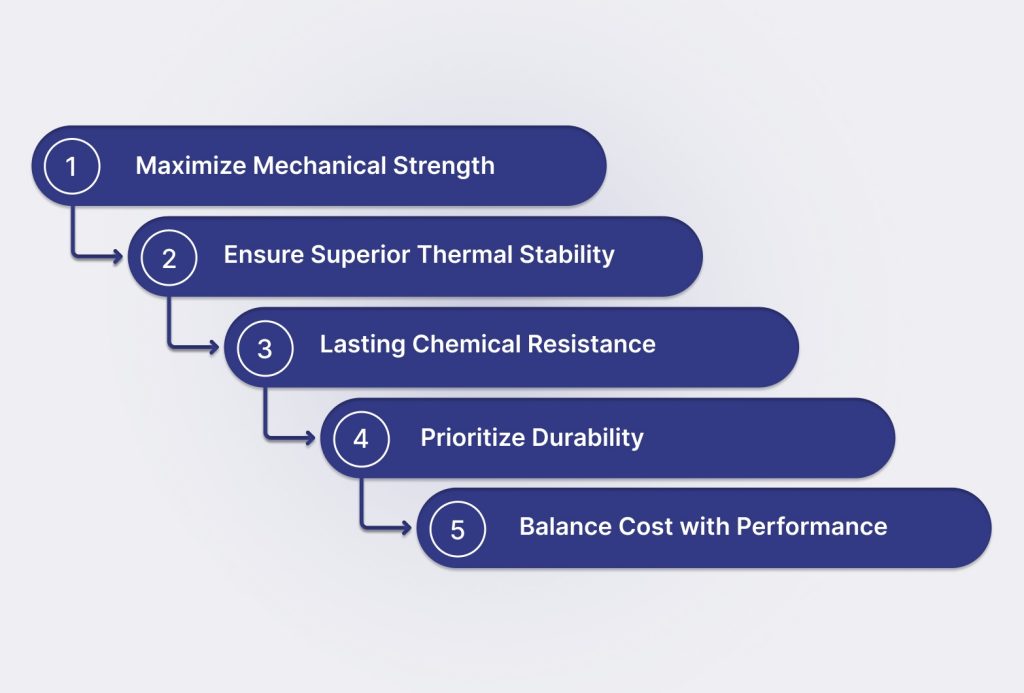
- Maximize Mechanical Strength: Ensure the plastic can withstand critical physical forces such as tension, impact, and compression in automotive, aerospace, and heavy equipment applications.
- Ensure Superior Thermal Stability: Select plastics that can withstand extreme temperatures, preventing degradation in high-heat environments like under-the-hood automotive parts or aerospace components.
- Chemical Resistance for Lasting Performance: Choose plastics that can resist chemicals and solvents encountered in manufacturing or harsh operational conditions, ensuring components stay reliable.
- Prioritize Durability: Evaluate the plastic’s resistance to wear, abrasion, and UV degradation, ensuring long-term performance for everything from automotive parts to industrial machinery.
- Balance Cost with Performance: Make an informed decision on material cost-effectiveness and availability while ensuring the plastic meets your performance and durability needs.
Moving on, we’ll look at five key applications of high-strength plastics across various industries.
5 Key Applications of High-Strength Plastics Across Manufacturing Industries
High-strength plastics are used extensively in a variety of sectors, from automotive to aerospace, offering durability, impact resistance, and long-term performance. The following applications highlight the versatility of these materials.
- Automotive: Use strong plastics for bumpers, interior panels, and structural components that endure impact and environmental challenges.
- Aerospace: High-strength plastics are essential for lightweight yet durable aircraft parts and insulation materials that can withstand high-stress environments.
- Defense: Military-grade plastics provide superior reliability and performance under the toughest conditions, ensuring safety and durability in defense systems.
- Heavy Equipment: Gears, bearings, and housings made from high-strength plastics are built to handle heavy mechanical loads and environmental stress.
- Mobility & EVs: Lightweight, durable, and impact-resistant plastics are ideal for components in electric vehicles, ensuring longevity and performance.
Also Read: How to Choose the Right Plastic Product Supplier for Automotive & Industrial Components
Next, we’ll explore the future trends in high-strength plastics in industrial manufacturing.
Future Trends in High-Strength Plastics in Industrial Manufacturing
As the demand for high-performance plastics grows, significant advancements are expected to shape the future of material science and manufacturing processes. Key trends to watch include:
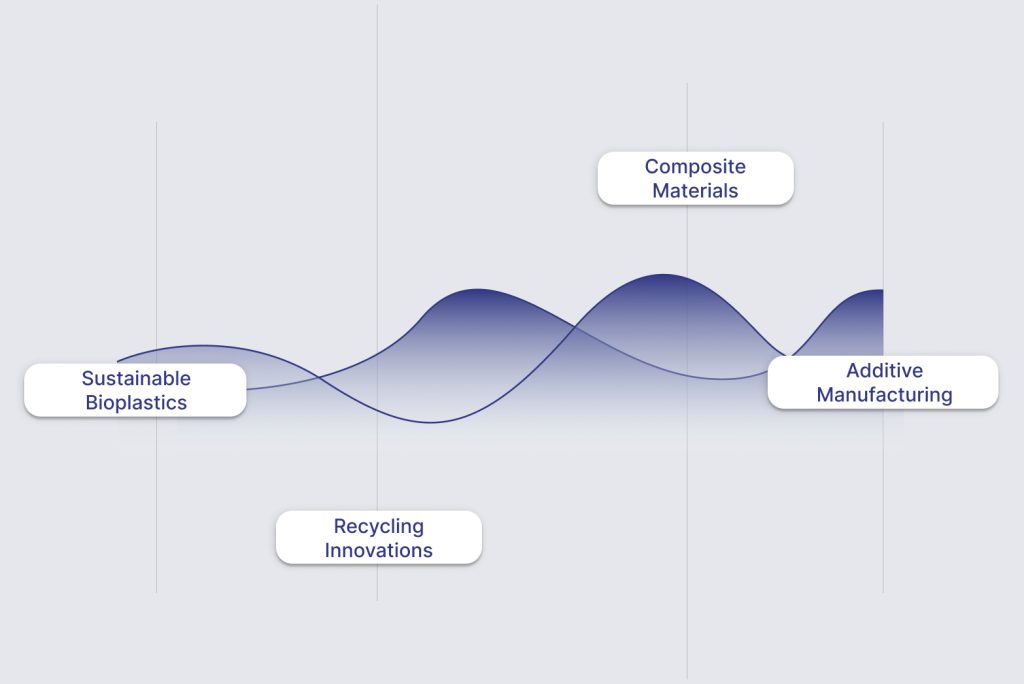
- Sustainable Bioplastics: Growing demand for eco-friendly plastics with performance similar to traditional materials, reducing the environmental footprint.
- Recycling Innovations: Advances in plastic recycling technologies will help reduce material waste and improve sustainability in manufacturing.
- Composite Materials: The combination of plastics with other materials like carbon fiber is enhancing strength and durability for demanding industrial applications.
- Additive Manufacturing: 3D printing and custom additive manufacturing techniques are enabling more flexible and efficient production of high-strength plastic components for specific industrial needs.
Also Read: Automotive Interior & Exterior Plastic Parts Manufacturing: Trends and Innovations in 2025
Now, let’s see how partnering with a reliable plastic component supplier can provide tailored plastic solutions for your needs.
Partner With the Right Supplier for Precision-Engineered Plastic Solutions
When selecting the strongest types of plastics for durability and impact resistance, partnering with Jairaj Group ensures you receive high-performance, precision-engineered components. With over 35 years of expertise and state-of-the-art manufacturing facilities in Faridabad, Rudrapur, Aurangabad, Manesar, and Sanand, we provide reliable solutions across industries like automotive, heavy equipment, defense, and aerospace.
Here’s how our advanced manufacturing technologies and high-quality materials are designed to meet your most demanding needs:
- Plastic Blow Molding: Perfect for producing plastic bellows & struts, hand grips, and mobility plastic base seating solutions, offering excellent flexibility and impact resistance for automotive and two-wheeler applications.
- Plastic Rotational Molding: Ideal for producing roto molding components, earth movers & heavy vehicle components, and mobility plastic base seating solutions, providing high strength and resistance to environmental wear in industrial and automotive applications.
- Extrusion Molding: Used for creating durable plastic bellows & struts, hand grips, and pipes/profiles for heavy vehicles, ensuring high performance in tough conditions.
- Plastic Injection Molding: Used for brake & accelerator pedals, shockers & suspension components, braking system components, and precision components from advanced polymers that require exceptional durability in high-stress automotive, heavy equipment, and defense environments.
- Materials like Nylon, PBT Arnite, and Polycarbonate: Engineered for bumpers, fuel line connectors, engine assemblies, and battery covers, ensuring strength, heat resistance, and chemical stability for automotive, aerospace, and defense sectors.
With Jairaj Group, you get high-strength plastic components designed for long-lasting performance, impact resistance, and regulatory compliance. Partner with us today to enhance the durability and reliability of your industrial applications.
Conclusion
Choosing the strongest type of plastic ensures durability, performance, and reliability in critical applications across industries such as automotive, aerospace, and defense. Materials like PEEK, POM, and ULTEM provide the strength and resistance required for long-term, high-performance components. Partnering with a plastic component supplier brings several benefits to manufacturers:
- Access to high-strength materials ensures reliable products that can withstand demanding conditions.
- Using durable plastics reduces maintenance costs and extends component lifespan.
- Suppliers offer tailored solutions to meet specific industry needs for strength and resistance.
At Jairaj Group, we offer precision-engineered plastic solutions such as advanced injection molding, rotational molding, and extrusion molding technologies that use materials like TPE/TPV, PBT Arnite, and Nylon for durable brake pedals, shockers, and precision components, ensuring high strength and exceptional durability.
Contact Jairaj Group for durable, impact-resistant plastic components that deliver top performance in demanding industrial applications.
FAQs
1. What factors determine the strength of a plastic material?
The strength of a plastic depends on its tensile strength, impact resistance, thermal stability, and chemical resistance, which are critical in high-performance applications.
2. Which plastic is the best for automotive components?
Plastics like ABS, PP, and POM are ideal for automotive components due to their impact resistance, strength, and performance in high-temperature and mechanical environments.
3. Why is Polycarbonate (PC) considered a strong plastic?
Polycarbonate’s exceptional impact resistance, high tensile strength, and optical clarity make it ideal for aerospace, automotive, and defense applications requiring durability and transparency.
4. How does PEEK compare to other strong plastics?
PEEK offers superior thermal stability, chemical resistance, and mechanical strength, making it ideal for high-stress applications in aerospace, automotive, and heavy equipment industries.
5. Is Nylon suitable for high-performance automotive parts?
Yes, Nylon is widely used in automotive parts due to its high tensile strength, impact resistance, and ability to endure harsh operating conditions under the hood.

